When Alexander Darke was young, he was given up by his family and put into the court system. After spending some time in group homes and institutions, Darke wanted out and escaped to the streets, where he was forced into prostitution to survive.
A few strangers lent a helping hand along the way, allowing Darke to eventually pull himself out of homelessness. He started with a job at a fast food drive-thru, then managed to get into college to study theater. But Darke realized the tech world was full of much more opportunity, so in 2001, he moved from Boston to San Antonio, Texas, to work in IT for the tech company Rackspace. About 10 years ago, he met a coworker, Matt — another gay tech geek. They’re now married and both still work at Rackspace.
Darke hadn’t been too focused in activism, but after Trump was elected, he felt driven to get involved. He joined the San Antonio chapter of the Sisters of Perpetual Indulgence, a nationwide volunteer organization that utilizes drag and costumes to draw awareness to important issues, and took on the name Sister Dottie Bair. Each sister has their own individual mission, and Sister Dottie is devoted to causes related to youth homelessness, including supporting the work of Thrive Youth Center, a homeless shelter in San Antonio dedicated to LGBTQ+ youth.
Just a few weeks ago, the 48-year-old held an event he organized called Just One Night to raise awareness about and money for homeless youth. He asked San Antonio residents to raise pledge money and commit to spending the night in a downtown park to experience what homelessness is like. Several locals participated and slept in the park, while the Sisters (and a local police officer) stayed up all night to keep a watchful eye. Through those pledges and an online fundraising page, Sister Dottie managed to raise $3,700 for Thrive Youth Center, the LGBTQ+ youth shelter in San Antonio, and Stand Up for Kids, a national nonprofit that works to end youth homelessness. He hopes to make this an increasingly large, annual event. He was also recently named as one of the 15 people (out of 200 applicants) to serve on San Antonio Mayor Ron Nirenberg’s new LGBTQ Advisory Committee.
This is Sister Dottie Bair’s story of enduring homelessness as a teenager, finding his way out, and getting involved with the Sisters of Perpetual Indulgence as a way to help youth who are still on the streets.
Profiles in Pride: When did you come out as gay, and what was that process like for you?
Sister Dottie Bair: Without wanting to dredge too deep, I grew up in a very non-traditional environment. I was given up as a problem child to the courts, so I was raised in various institutions and group homes over the course of several years. That complicated my coming out process, because in those environments, anything different about you was used as a weapon — whether it be by other kids trying to protect themselves from being the focus, so they would throw it off on somebody else, or by the actual staff trying to psychoanalyze you and pick you apart.
I learned very quickly that anything that differed from the standard norm, you suppress and don’t think about it. So I was actually very nonsexual; I had no sexuality. I just turned it off for a long time. Then I ran away from those places when I was 16. I ended up on the streets, and very quickly my sexuality became apparent.
That’s where my whole thing about helping homeless youth comes from. I ran from these institutions and very quickly had to fend for myself and figure out what that meant. That’s kind of where I figured out, “OK, it’s not just that you think you like dudes better than girls, you really like dudes.” I did the whole “pretend to be bi” thing for a while there, but the fact of the matter is, while I’m capable of loving women, and I have dated multiple women, the sexual attraction is purely on the male side.

PIP: How did being homeless as a youth shape who you are today?
SDB: To be honest, it saddled me with a lot of really uncomfortable baggage that took me a long time to pick apart. I made a lot of choices for my survival, and when I look at logically from a distance, or when I look at it as choices somebody else made, I think, “Well of course you would do that, it’s important that you survive. You had to get through what you were experiencing.”
But having made those choices filled me with a lifetime of guilt and shame. Without wanting to beat around the bush a whole lot, I made choices to sell myself to make money. Kids learn very quickly that the number one commodity they have is themselves, because there are people out there who are very aware they can’t just go to a shelter and do a lot of things that an adult homeless person could, so they play off of that. So it definitely informed my life path in a lot of ways. It would have been a lot easier if I hadn’t gone through that, but at the same time, it introduced me to a lot of really incredible people, both on the homeless side and the people who helped me get out of that situation.
PIP: How did you manage to get out of that situation?
SDB: First of all, I’m painfully aware that had I been a young black boy, I probably wouldn’t have. That’s one of those weird guilt things that I have now, that I’ve become hyper-aware of white privilege. When I look at back at my life, all the places where someone held out a hand and let me climb up, they probably would not have done it with a person of color.
The very first job I got was a Hardee’s drive-thru. I was tired of trying to sleep in parked cars and hiding in the elevated walkways that connected all the buildings in downtown Des Moines, Iowa. So I went to this 24-hour Hardee’s, and I put in an application. When the manager sat down with me, he said, “You didn’t put down an address.” I’m like, “All I need to tell you is I don’t have one, but I promise you I’ll be here every night. I promise you.”
He just stared at me for a little bit, and he said, “OK, I’m trusting you. You can do the graveyard shift.” I think he got that I was looking for a place to be all night and that I was working to climb out. And he let me.
I don’t know what his particular motivation was, but from there I got into college. I took a bunch of my writing samples to the school in town that I was aware of. The theater department looked at my writing samples, and they said if I got a GED, they’d give me a scholarship to go here. I had dropped out of high school, because getting money and someplace secure to sleep was more important than attending classes. So I went and took the test and got my GED, and I accepted the scholarship and got into college. From there I doubled down on a whole lot of student debt to study theater only to become a computer guy, but it all worked out in the end.
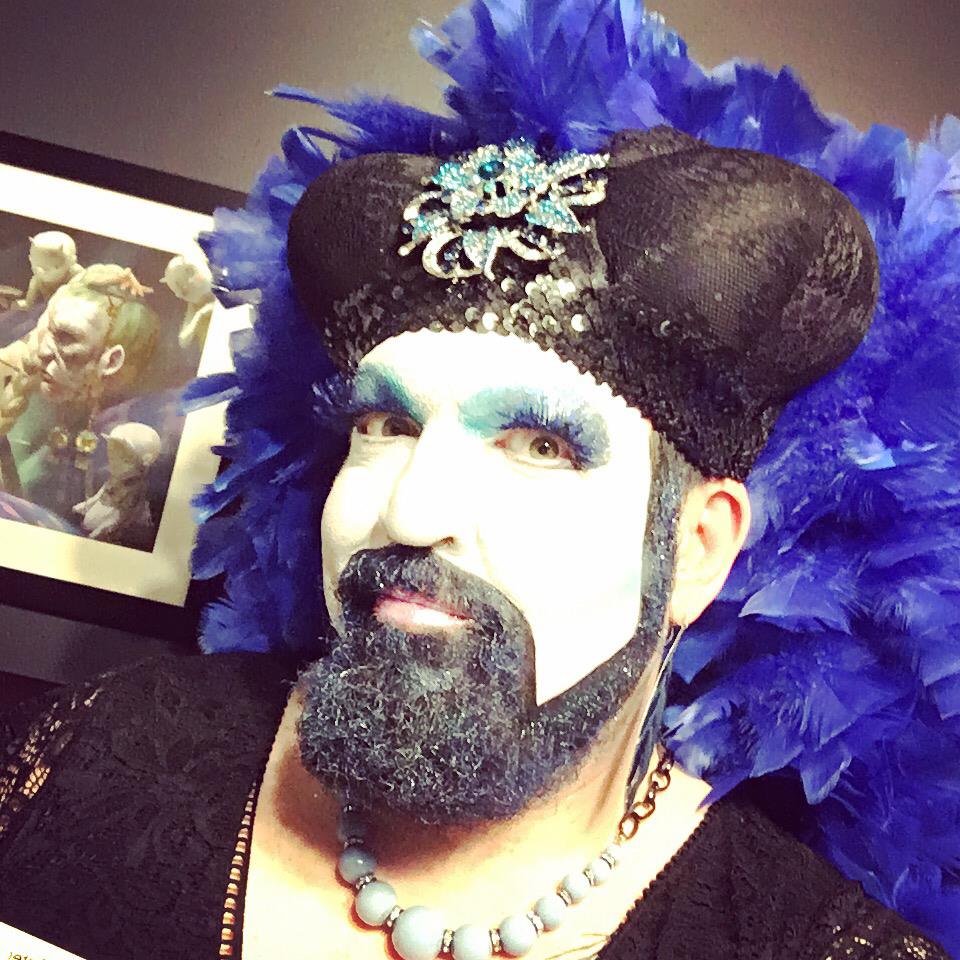
PIP: That’s wonderful. Moving on to your volunteer work, can you tell us a little about the Sisters of Perpetual Indulgence and their history?
SDB: In 1979, Easter weekend, four individuals went out in nun habits, and they were the original founders. The nun habits came with one of the original sisters from Iowa, where he’d just done a production of “Sound of Music,” and he had these costumes. They put them on and went out, and it caused quite a stir.
They were like, “Wow, we got so much attention, let’s keep doing this.” It became a thing where they wanted to use the attention to focus on activism. It wasn’t originally necessary always just gay activism. There was stuff about racism, there was stuff about gay teachers being targeted. Their appearance on the scene coincided with the HIV/AIDS outbreak that happened, and those two things just came together in a moment of synergy. One of the early members was a nurse that helped them write a pamphlet called “Play Fair.” At its most distilled point, it was “we don’t know what this is, but here’s what we do know, and here are ways you can try to stay safe.”
They stood on street corners and handed these out. At the time, nobody wanted to talk about AIDS. Nobody. It was this “gay disease.” But it was really hard to ignore nuns standing on street corners in this wild makeup and getup handing out pamphlets. They brought attention to the issue because they demanded that people look at them.
They did the first ever HIV/AIDS fundraiser; I believe it was a dog show. They did the very first safe sex pamphlet, and they’ve raised so much money over the years that has gone to education and awareness. Obviously that has branched out as time has gone on into other things, like homeless youth. But in the beginning, it just kind of took off, because at the time, an entire generation of gay men vanished, and America wasn’t talking about it. The Sisters demanded that they talk about it.
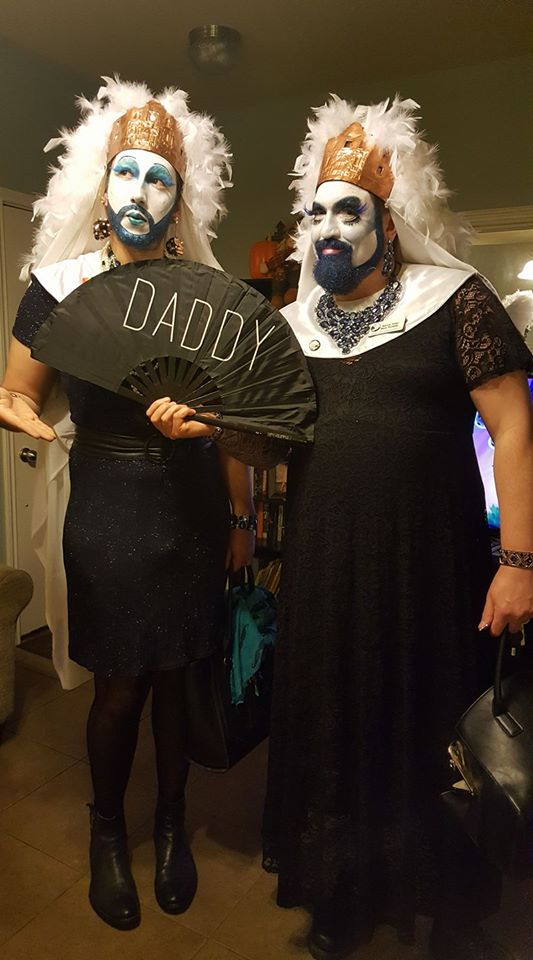
PIP: When did you first learn about the Sisters of Perpetual Indulgence, and when did you get involved yourself?
SDB: I have always sort of been aware of the Sisters. I vaguely remember seeing stuff about some of their activist antics in the ‘80s, because at one point, they ended up in Newsweek, I believe, because they did an excommunication of Falwell and the Pope. It was the ‘80s, so it was “look at these silly queers” kind of reporting, but they hit national news.
I always respected that kind of punk rock, “fuck you” attitude. As I came into my own sexuality, and the first time I went to San Francisco, I ran into the Sisters. And I was like, “I know about you guys, I love you!” I’d been a huge fan forever, but I never really thought about joining, because drag really isn’t my thing; it’s not my schtick. I probably would have just stayed a fan, but then Trump got elected.
I had this moment where two things hit me: one, the trans community right now is facing a whole lot of attention that to me feels very similar to what I faced in the ‘80s. The political football, the demonization that’s going on — the bathroom bills, all of that crap. There are so many echoes there for me of what I lived through in the ‘80s.
I also realized that I have a lot of privilege, and that I don’t necessary pique people’s radars. I’m a big, fat, blonde dude who does IT work. They just think I’m a gamer nerd or comic book nerd most of the time when they look at me. I’m very secure, and I wanted to really put more on the line. It’s really hard to do activism in drag in Texas. There’s no point that I step out of my car in a dress, white face, heels, and walk the three blocks to the bar where I’m not painfully aware that I’m in Texas.
It helps to remind me that I’ve been very comfortable, but there’s still a fight to be had until everyone is comfortable and everyone is safe. For me, with Trump being elected, there are a lot of people who came out under Obama that I don’t think understand why we tend to think of bars as a safe haven and why we refer to ourselves as family, who I think are getting rude lessons in that now, because a whole lot of ugliness is being awoken.
So like I said, I really just want to double down on doing a whole lot more. I can’t fix Trump, but I can fix my local community and can work in my local community and try to do more and be more and try to help people. That’s how I came to the Sisters.
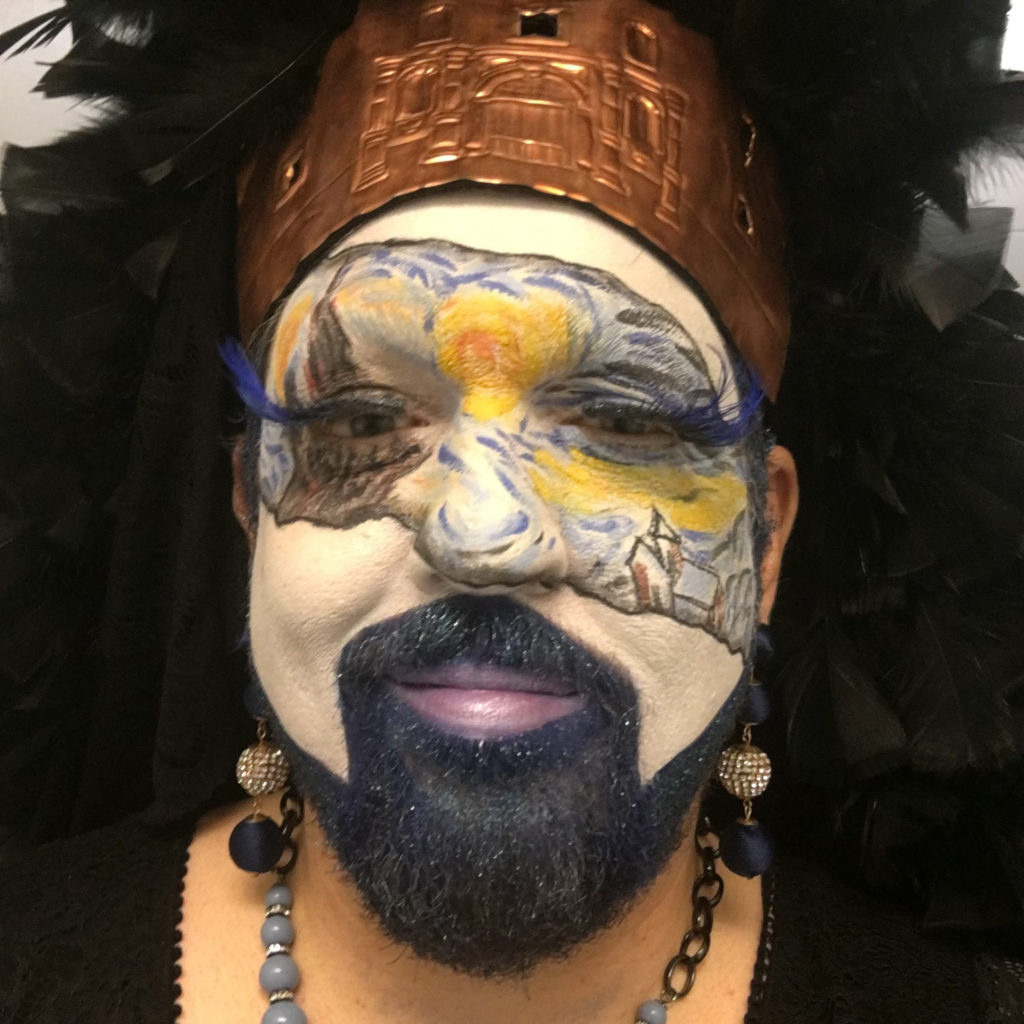
PIP: What type of work do you with the Sisters?
SDB: Every Sister has a calling or issue that’s one of their primary focuses. For me, it’s homeless youth because that was my story; that was my path. I’m trying to set Just One Night up to be a yearly event that grows to be a city-wide event and hopefully with thousands of participants raising an ungodly amount of money, because God knows we need it.
But I’m also talking to Thrive about potentially starting up computer classes, because tech was my way off the streets. And I’m pretty sure there are other tech-savvy kids out there where I can hold that hand out and be like, “Hey, let’s get you up here.” Because there are now a lot of tech opportunities in San Antonio, where we can try to help them have a career. So for me, that’s my focus.
For other sisters, it’s HIV education and awareness. Cher Noble, one of the Sisters who was at the Just One Night event, hers is a lot around animals. Her novice project was for the Animal Defense League, an animal shelter in San Antonio. It’s pretty much anything in the local community. It doesn’t necessarily have to be LGBT.
I’m actually trying to get the Sisters to work more a little more outside the gay bar strip when it comes to things like HIV awareness and education; I feel like we should be telling a whole lot of straight kids about PrEP. It’s not just a gay man thing. If I were a 20-year-old college student, regardless of my sexuality, I’d love to know there’s a pill I could take that would take HIV off the table. So we’re doing First Fridays and stuff like that to get out there and talk to people and just make them aware of what their options and choices are and that they’re being safe. We do a lot of different stuff. My primary focus is always going to be homeless youth just since that’s my path and my story.
I should mention what the actual mission of the Sisters is. Our official mission is to “expiate stigmatic guilt and promulgate omniversal joy.” It’s true: The core of being a Sister and what we do is making sure that people understand that they are loved and that they are enough as they are, and that they need to go out and be the best goddamn them that they can be.
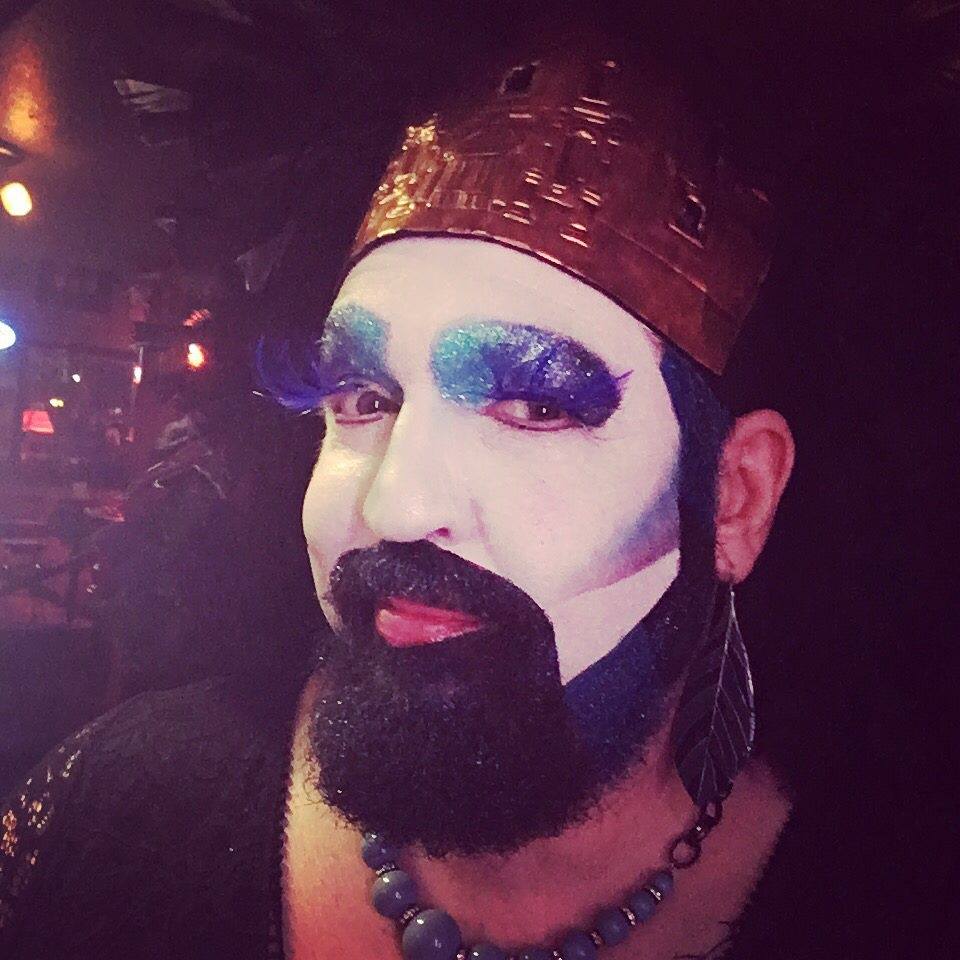
I’ve been really, really privileged to have these things that we call “Sister moments.” You’d be very surprised what having a white face painted on causes people to tell you. There was one night out at a bar, where a young trans woman was out for the first time, and she was feeling very uncomfortable. I sat with her and talked with her for a while. Hearing her story and her journey, it was so amazing. I got to have a moment.
I said, “You know what, you’re fucking beautiful, just be you, screw everybody else.” That’s our mission as Sisters. That’s the core of what we do. We’ve spent our lives being told that we’re not good enough, we’re not normal, that God hates us. The Sisters are here to say, “You know what, we have our own spirituality, we have our own love, and we’re amazing people. You’re amazing — be amazing.”
PIP: I love it. Congratulations on being selected for the San Antonio mayor’s LGBTQ advisory committee. Do you know what kind of work you’ll be doing yet?
SDB: I don’t really know a lot about it other than we’re serving in an advisory capacity. I know that I put a lot of what I just said about my motivations for joining the Sisters into that application, that I feel like San Antonio, as one of the 10 largest cities in the U.S., has a responsibility on a human level to recognize that the transgender community is under a lot of fire, and that they have the opportunity to do the right thing, to take a stance, and say, “You know what, the state may be a hateful ball of whatever, but we’re gonna stand by our transgender community.”
Because I know so many transgender people, and I know what that feeling is like, of spending your life under the microscope of politics and being demonized. San Antonio really has a chance to say, “You know what, not here.” I am gonna fight tooth and nail to see that they do. I don’t know if I have the power, but I’m going to try.

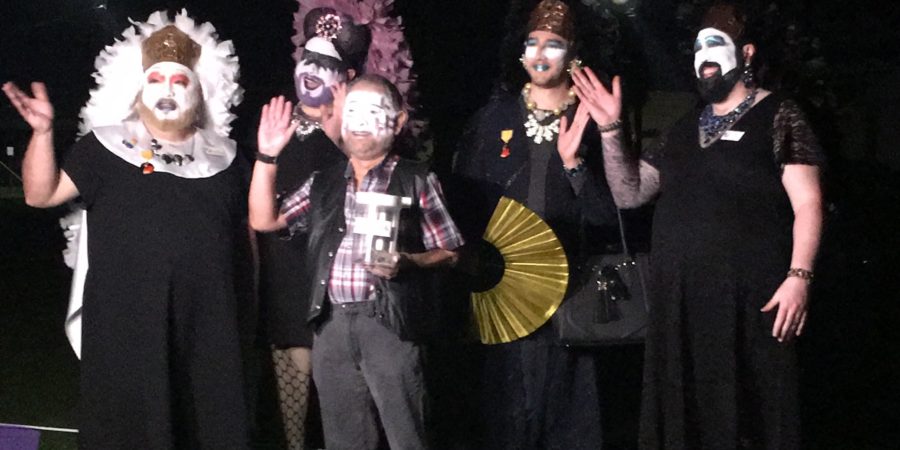
[…] Alexander Darke: Using drag and charity work to fight back […]